Princeton is a well-acclaimed university. Today, it is also offering its courses to the masses through online platforms like edX, Coursera, and its online wing itself.
We have come up with a list of 16 top Princeton free courses online for people who want to take up the best in its field course. This article covers many industries like Computer, Architecture, Altruism, Computer Science, Writing Case Studies, Algorithms, and many more.
16 Princeton Courses That You Can Take For Free
- Algorithm, Part 1 – [Coursera]
- Computer Architecture – [Coursera]
- Bitcoin and Cryptocurrency Technologies – [Coursera]
- The Art of Structural Engineering: Bridges – [edX]
- Paradoxes of War – [Coursera]
- Civil Liberties – [edX]
- The Brain and Space – [Coursera]
- The Art of Structural Engineering: Vaults – [edX]
- Constitutional Interpretation – [edX]
- Princeton Online Courses – [Princeton University]
- Effective Altruism – [Coursera]
- Making Government Work in Hard Places – [edX]
- Computer Science: Programming with a purpose – [Coursera]
- Imagining Other Earths – [Coursera]
- Writing Case Studies: Science of Delivery – [edX]
- Analysis of Algorithms – [Coursera]
16 Free Online Classes Princeton Offers
1. Algorithm, Part 1 – [Coursera]
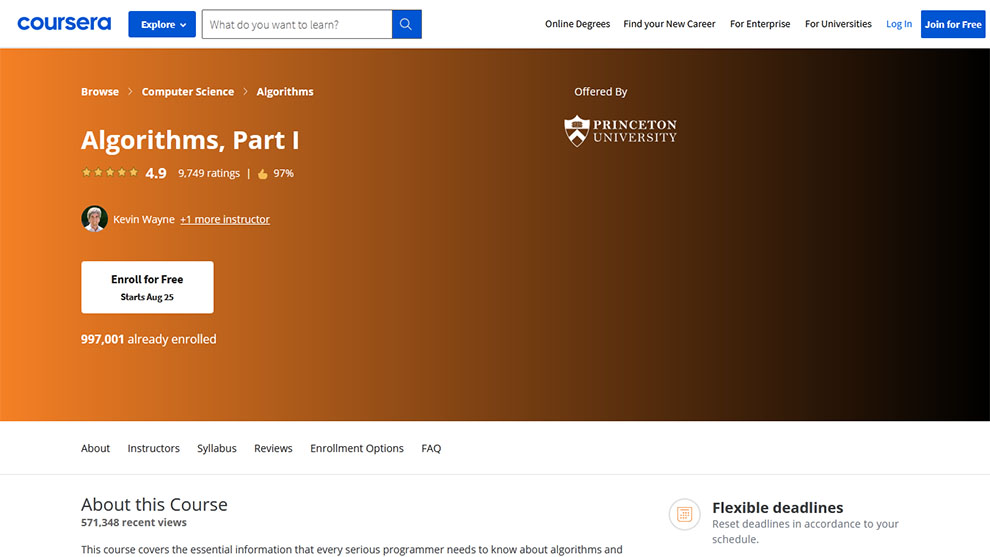
Learn the fundamentals of algorithms and databases that every professional developer should know, focusing on real-world situations and rigorous scientific evaluations of Java code with this one of the best Princeton free courses online. Java does have career changing potential.
| Rating | 4.9 |
| Enrollment | 992,565 |
| Paid | No |
| Certification | No |
| Duration | 54 hours |
| Instructor | Kevin Wayne & Robert Sedgewick |
| Cons | Not a beginner-friendly course |
Topics Covered
The topics covered in this course are:
- Analysis of Algorithms
- Elementary Symbol Tables
- Geometric Applications of BSTs
- Symbol Table Applications
- Balanced Search Trees
Prerequisites
For this course, you need:
- A working computer
- An internet connection
- Basic knowledge of Java
Who should take this course?
- People looking to learn Java
- Anyone interested in algorithms and programming
- Programmers wanting to start their career
Review KR.
An amazing course which enables one to appreciate and analyze various algorithms used in various applications. Must take for anyone who wants to build a career in computer science or related fields.
2. Computer Architecture – [Coursera]
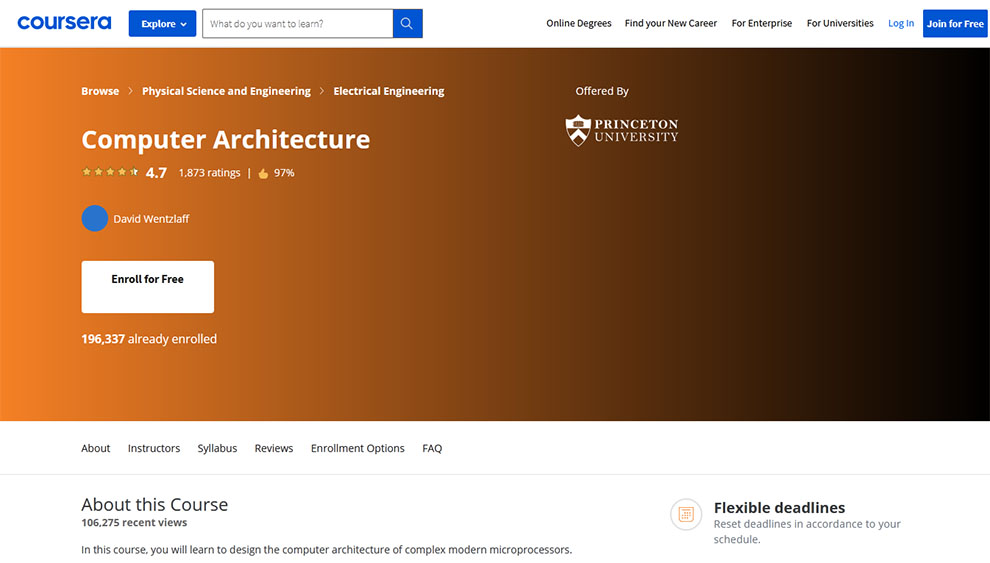
The next course in our list of the best Princeton free courses online offers how to construct the hardware implementation of today’s complicated and advanced integrated circuits.
| Rating | 4.7 |
| Enrollment | 195,615 |
| Paid | No |
| Certification | No |
| Duration | 50 hours |
| Instructor | David Wentzlaff |
| Cons | This advanced course doesn’t offer a certificate |
Topics Covered
The topics covered in this course are:
- Instruction Set Architecture and Microcode
- Branch Prediction
- Memory Protection
- Vector Processors and GPUs
- Large Multiprocessors
Prerequisites
- Java program
- Working device
- Self-discipline
Who should take this course?
These classes are for anyone looking for a course to design computer architecture for complex machines.
Review AB.
Course quality was top notch. Certainly one of the best courses on coursera. Exams are hard but are a good mirror of how you can expect the actual univ exams to be.
3. Bitcoin and Cryptocurrency Technologies – [Coursera]
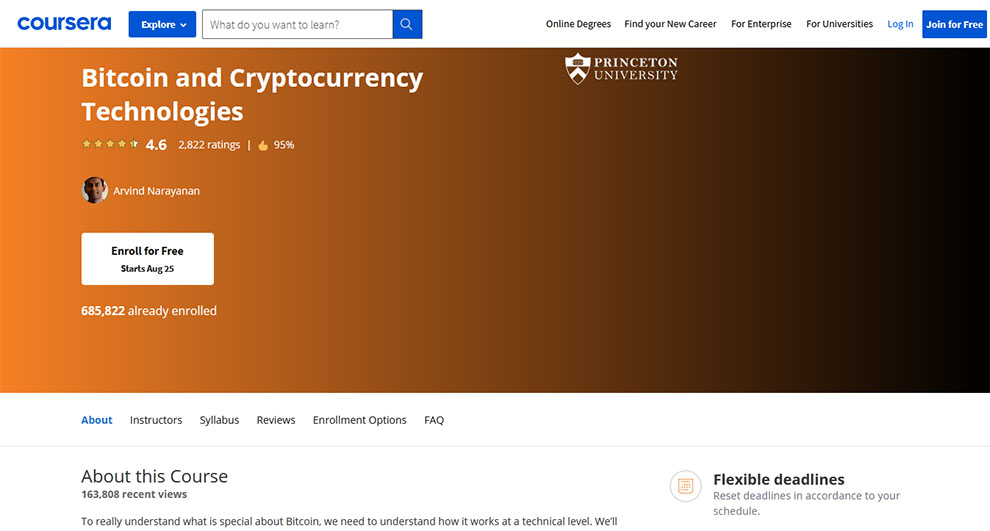
Learn the fundamentals of Bitcoin, its terminology, how it operates, and so much more in this course. You will also learn about how cryptocurrency is regulated and the future of Crypto in these classes.
| Rating | 4.6 |
| Enrollment | 683,611 |
| Paid | No |
| Certification | No |
| Duration | 23 hours |
| Instructor | Arvind Narayanan |
| Cons | Doesn’t provide enough resources |
Topics Covered
The topics covered in this one of the best Princeton free courses are
- Introduction to Cryptocurrencies
- Bitcoin and Decentralization
- Mechanics of Bitcoin
- How to store Bitcoin
- Geometric Applications of BSTs
- Symbol Table Applications
- Balanced Search Trees
Prerequisites
Some background with Bitcoin knowledge will help but is not mandatory.
Who should take this course?
- People looking to learn about cryptocurrencies
- Anyone interested in algorithms
- Anyone who wants to gain knowledge about bitcoins
Review DD.
I would like to thank all people who contribute to this course. The course answers “all questions” of newcomers. I like its format, it gives both perspective and detail view of domains.
4. The Art of Structural Engineering: Bridges – [edX]
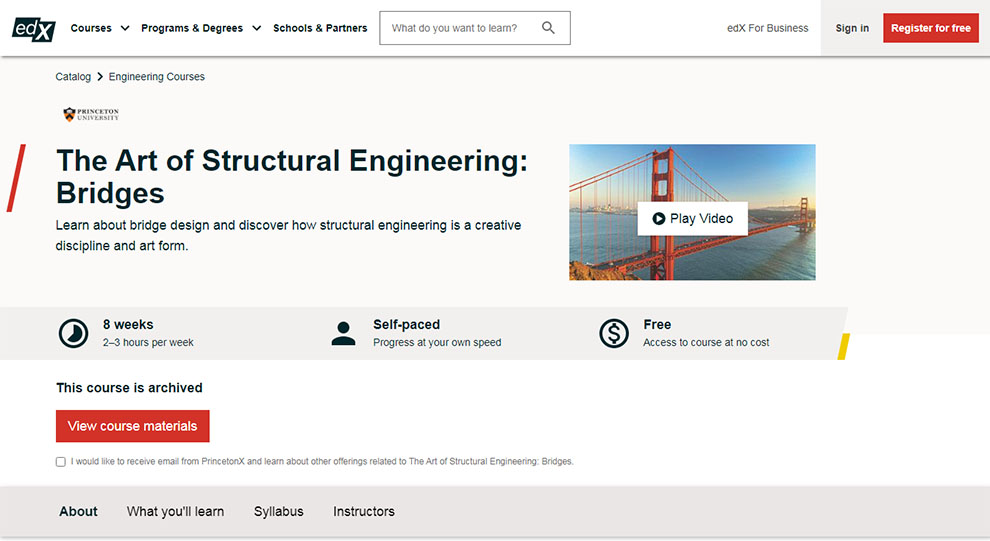
Find out how structural engineering may be viewed as an art form by studying the process of bridge design.
These Princeton free courses will teach you to evaluate bridges from three angles: Effectiveness, Frugality, and Style
| Course speed | Self-paced |
| Course materials | Yes |
| Paid | No |
| Certification | No |
| Duration | 8 weeks (3-4 hours weekly) |
| Instructor | Maria Garlock |
| Cons | This coursed doesn’t offer certification |
Topics Covered
The topics covered in these free online classes Princeton is
- How to calculate building efficiency using formulas
- How to judge a building using the standards of structural art
- Impact of socioeconomic and cultural factors on building construction
Prerequisites
There are no prerequisites to enroll in this course.
Who should take this course?
- Absolute beginners
- Novice engineers.
- People with a construction background. Get some knowledge on civil engineering that will help you further with the course.
5. Paradoxes of War – [Coursera]
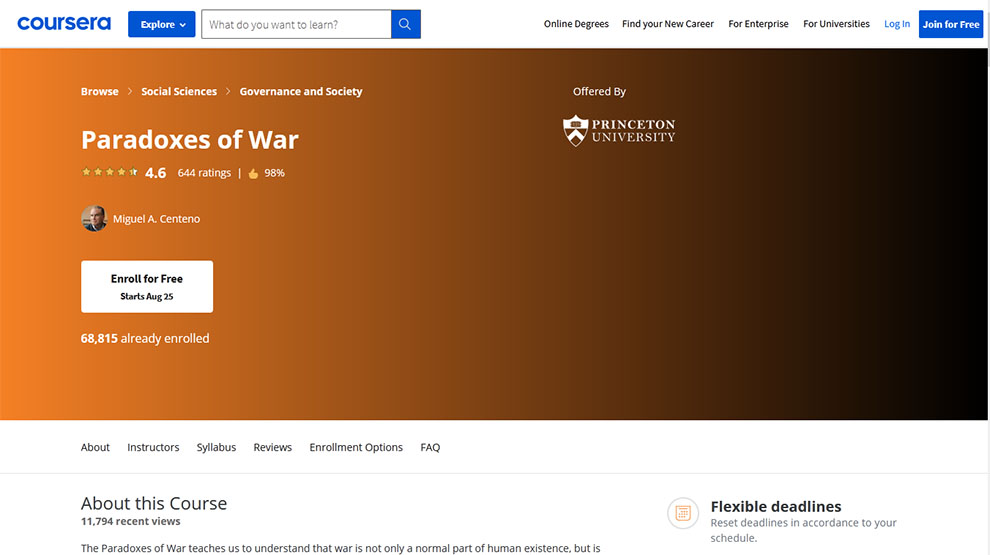
This among the best Princeton free courses online “Paradoxes of War” enlightens us on the reality – that conflict is not only an inevitable component of human life but also one of the most significant contributors to the formation of our identities as a species.
| Rating | 4.6 |
| Enrollment | 68,749 |
| Paid | No |
| Certification | No |
| Duration | 14 hours |
| Instructor | Miguel A. Centeno |
| Cons | Might take a long time to finish this course |
Topics Covered
The topics covered in this course are:
- The basic paradoxes of War
- The Nature of War
- The Causes of War
- The Experience of War
Prerequisites
- Basic knowledge of war history
- Stationary for note-taking
Who should take this course?
- Anyone looking to gain knowledge in the subject
- History students
- College professors
Review JY.
Just brilliant. After this course you’ll get a comprehensive idea of war, and of the society itself.
6. Civil Liberties – [edX]
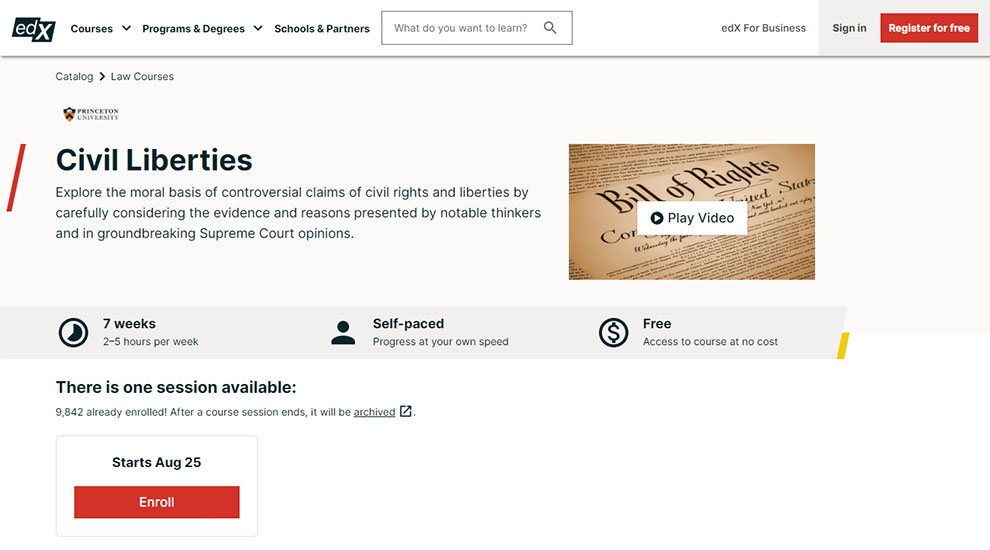
Examine the ethical underpinnings of contentious assertions on freedoms and civil rights with these Princeton free courses online. This is done by giving due consideration to the data and reasoning put forth by influential thinkers and in precedent-setting decisions handed down by the Supreme Court.
| Course speed | Self-paced |
| Level | Intermediate |
| Paid | No |
| Certification | No |
| Duration | 7 weeks (3-5 hours per week) |
| Instructor | Robert P. George |
Topics Covered
The topics covered in these free online classes Princeton offers are:
- What the United States Constitution and the nation’s history have in common with civil liberties and protections
- What critical civil rights concerns have philosophers considered?
- The reasons given in landmark Supreme Court decisions
- Tips for evaluating contentious defenses of individual liberties and privacy
- A comprehension and regard for persons with divergent viewpoints
Prerequisites
- Basic understanding of the US constitution
Who should take this course?
- University students
- People who are studying law
- Anyone looking to learn about the subject
7. The Brain and Space – [Coursera]
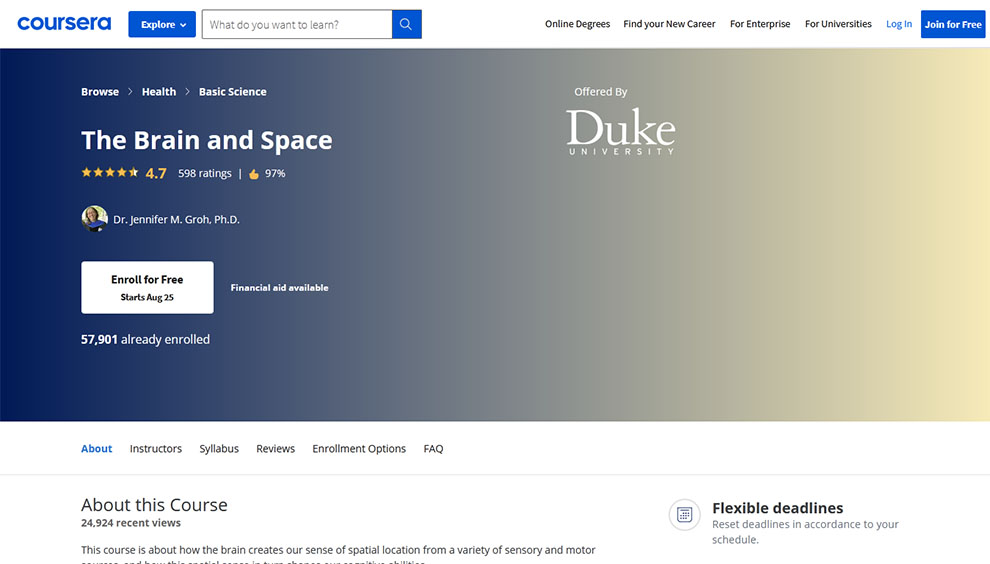
These Princeton free courses online cover how our diverse sensory and motor experiences contribute to the formation of our brain’s sense of location, and how that perception in turn influences our other cognitive functions.
| Rating | 4.7 |
| Enrollment | 57,698 |
| Paid | No |
| Certification | No |
| Duration | 10 hours |
| Instructor | Jennifer M. Groh |
| Cons | This is not a comprehensive course |
Topics Covered
The topics covered in this course are
- Body, and Neural Signals
- Everything about brain maps
- Sound and Brain Representations
- Reference Frames and Navigation
- Memory and Cognition
Prerequisites
- Basic knowledge of the nervous system
- A working device with internet
- Note taking supplies
Who should take these Princeton free courses?
- Medical professionals
- Students who have opted for biology
- Anyone interested in learning about the human brain
Review GO.
I found this course to be interesting and informative. Dr Groh does a great job in making the content relatable and easy to understand even without a background in the brain.
8. The Art of Structural Engineering: Vaults – [edX]
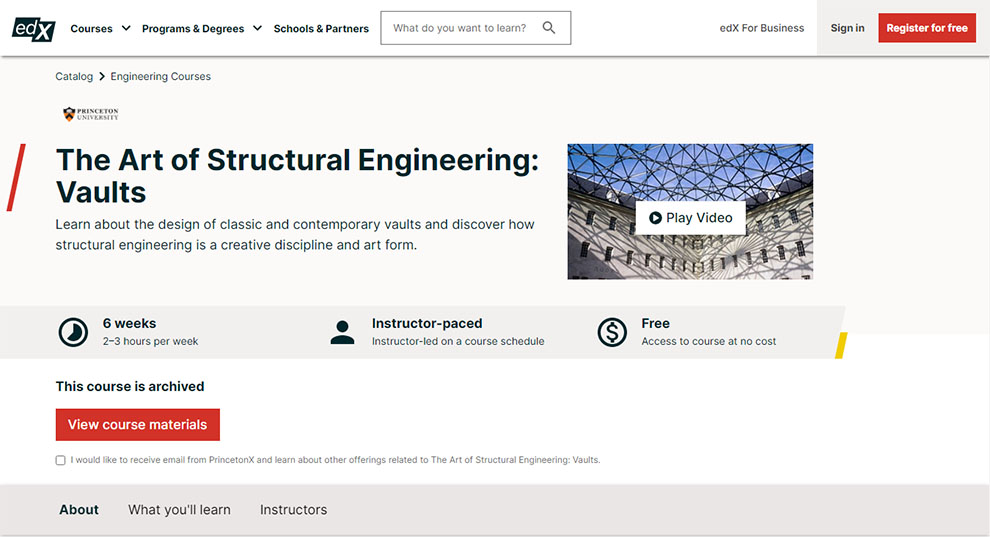
Understand the creative process behind the design of both traditional and modern vaults. You also learn how structural engineering can be considered a profession and an art form in its own way with these Princeton course.
| Course speed | Self-paced |
| Course materials | Yes |
| Paid | No |
| Certification | No |
| Duration | 6 weeks (2-3 hours weekly) |
| Instructor | Maria Garlock |
| Cons | This coursed doesn’t offer certification |
Topics Covered
- Methods for calculating a building’s energy performance
- In what ways can a building be evaluated using criteria specific to structural art?
- Economic, social, and cultural factors that affect building construction
- How to evaluate vaulted structures like roofs, cantilever brakes, hypars, and spans
Prerequisites
There are no prerequisites to enroll in this course.
Who should take this course?
- Absolute beginners
- Structural engineers
- Working professionals in construction
- People with a construction background
9. Constitutional Interpretation – [edX]
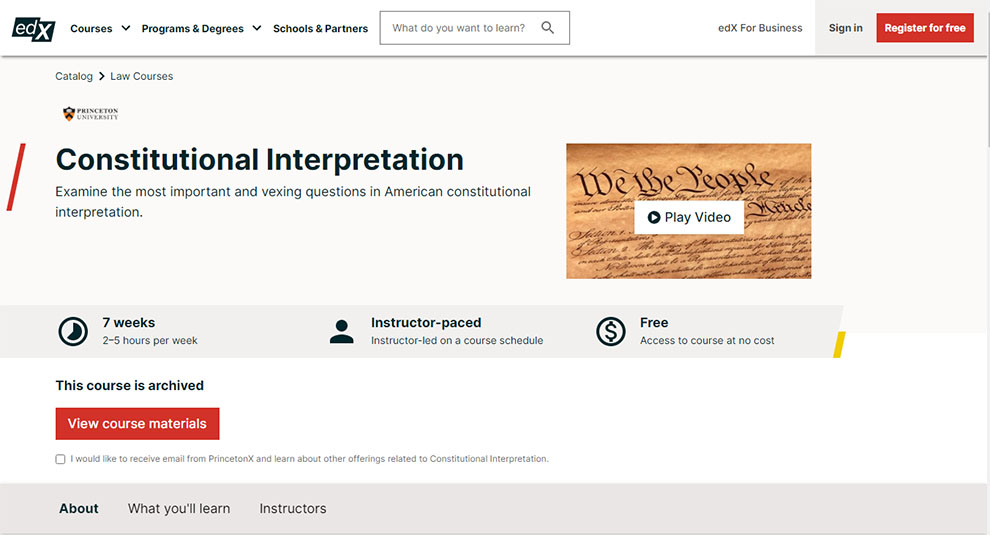
With the assistance of these free online classes Princeton has for you, you will be able to get the knowledge necessary to investigate the most significant and perplexing questions about the implementation of the American Constitution.
| Course speed | Instructor-paced |
| Course materials | Yes |
| Paid | No |
| Certification | No |
| Duration | 7 weeks (2-5 hours weekly) |
| Instructor | Robert P. George |
| Cons | This is an instructor-paced course. |
Topics Covered
- The primary ways to interpret the Constitution
- The history of judicial review
- The issue of who has the most power between Congress and the president
- The relationship between a national government and state government
- The function of the judiciary is to protect the liberties of religion, expression, and ownership.
Prerequisites
There are no prerequisites to enroll in this course.
Who should take this course?
- Absolute beginners
- Law students
- Working professionals
- Anyone interested in learning the subject
10. Princeton Online Courses – [Princeton University]

Princeton offers a range of courses for different niches. Check them out for yourself and enroll in a suitable one. But, keep in mind that these courses do not bear a certificate or credit. So, if you are here looking for Princeton free online courses with certificates, it’s not your day.
Courses Offered
Listed below are some of the courses you could take:
- Global Systemic Risk
- Bats, Ducks, and Pandemics: An introduction to one health policy
- Constitutional Interpretation
- Civil liberties
- The Art of Structural Engineering: Vaults
- Networks Illustrated: Principles without Calculus
- Writing Case Studies: Science of Delivery
- HOPE: Human Odyssey to Political Existentialism
Prerequisites
- A functional computer
- Internet access
- A zeal to learn something new
Who should take this course?
- Anyone who wants to learn something new
- Anyone who is looking for free courses from a prestigious university
- People who want to begin a new career
11. Effective Altruism – [Coursera]
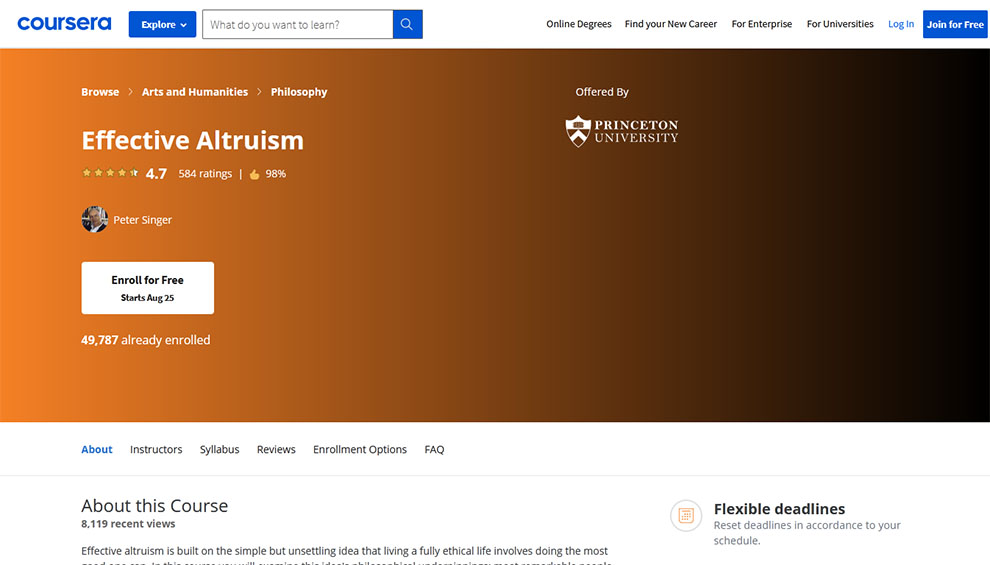
As you progress through these Princeton free courses online, you’ll investigate the philosophical foundations of effective altruism. You also hear from inspiring individuals who’ve reoriented their lives to align with the ideology and reflect on how you may put the principles you’ve learned to use in your own life.
| Rating | 4.7 |
| Enrollment | 49,713 |
| Paid | No |
| Certification | No |
| Duration | 12 hours |
| Instructor | Peter Singer |
Topics Covered
- The background in philosophy
- Poverty and Affluence
- To what extend do you help others?
- Effective Altruism and Career Choice
- Why Act Ethically?
Prerequisites
- Basic knowledge of the subject
- A working device with the internet
- Note-taking supplies
Who should take this beginner level course?
- Working professionals
- Anyone interested in learning about altruism
Review KP.
This course is excellent, especially for those wanting to understand the basics to ethics and Peter Singer’s (and others) thinking. Good amount of detail and well-structured.
12. Making Government Work in Hard Places – [edX]
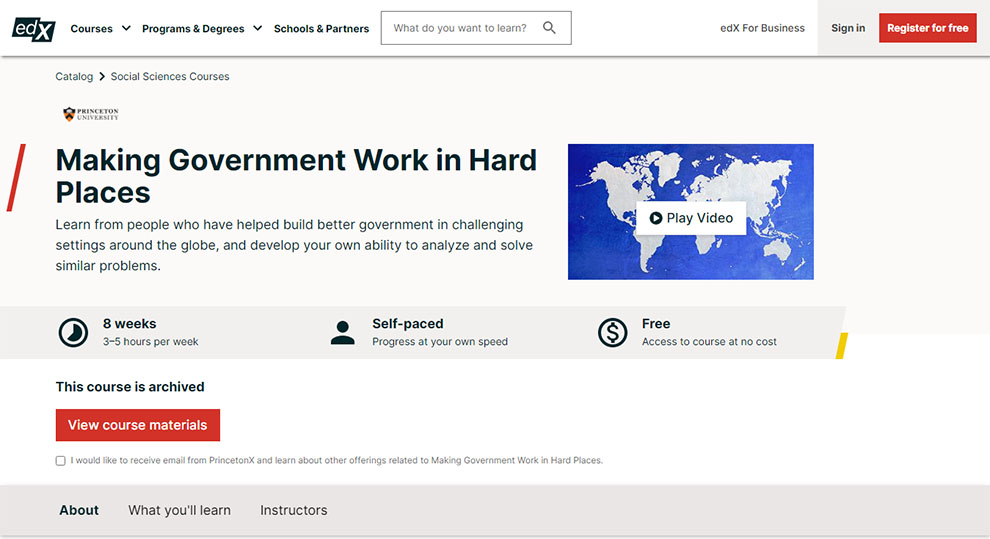
With the free online classes Princeton gives you, you will learn from individuals who have contributed to the development of better governments in challenging settings all around the world. You will also develop your abilities to assess and solve challenges that are analogous to those situations.
| Course speed | Self-paced |
| Level | Intermediate |
| Paid | No |
| Certification | No |
| Duration | 8 weeks (3-5 hours per week) |
| Instructor | Jennifer Widner |
| Cons | This course doesn’t offer a certificate |
Topics Covered
- Improving public service delivery through lowering costs, administrative overhead, and waste
- Boosting rural service quality through public oversight and community-led initiatives
- Breaking through Capacity Barriers
- Making it easier for the cabinet to work together
- Creating a plan and incentives to keep the change going.
Prerequisites
- There are no prerequisites to enroll in this course.
Who should take this course:
- Students in Higher Education
- Intending lawyers and judges
- Anyone interested in gaining knowledge on the topic
13. Computer Science: Programming with a purpose – [Coursera]
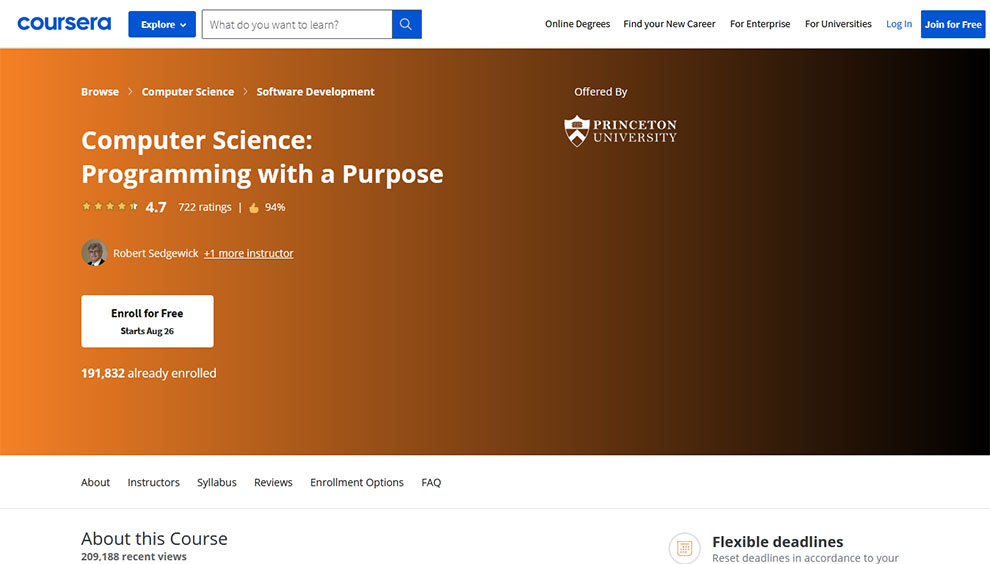
These Princeton free courses introduce students to Java programming and teach them the fundamentals of computational problem solving, skills that may be applied in various professional and personal contexts.
While mastery of Java is intended, the course material will concentrate on more general programming principles as well.
This class will explore the first part of the author’s book, “Computer Science: An Interdisciplinary Approach.” The objective of this training is to provide students who need to master computing or wish to learn it with instruction in a scientific format.
| Rating | 4.7 |
| Enrollment | 189,062 |
| Paid | No |
| Certification | No |
| Duration | 88 hours |
| Instructor | Kevin Wayne & Robert Sedgewick |
| Cons | The assignments seem difficult for a beginner |
Topics Covered
- Basic programming concepts
- Conditionals and loops
- Input and output
- Function and libraries
- Abstract data types
- Creating data types
- Programming languages
Prerequisites
- Basic computer knowledge is essential
- A working device
Who should take this course?
- College students
- High school students
- Professionals interested in learning basic programming skills
- People with no previous experience in programming.
Review VS.
Beautiful course. I am a software developer with 10+ years of experience in programming and have never realized depth of actual MATH behind all that I do. Thank you Robert Sedgewick, you are the BEST.
14. Imagining Other Earths – [Coursera]
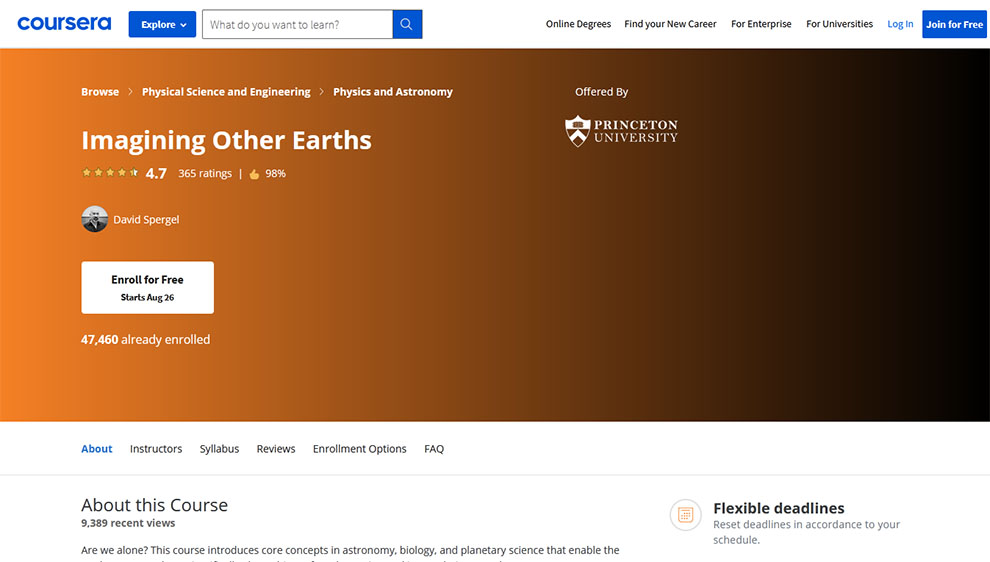
The student will get a foundational understanding of astrophysics, biology, and space sciences through the study of these Princeton free courses online, which will enable them to formulate scientific hypotheses regarding the significance of this subject and create their planetary panels.
The course covers topics such as the composition of our Planetary System, the discovery of new planetary systems, and the cosmological distance from Earth to the closest star. The lecture then progresses outwards, covering topics such as the vastness of our planet and the observable cosmos.
| Rating | 4.7 |
| Enrollment | 47,382 |
| Paid | No |
| Certification | No |
| Duration | 26 hours |
| Instructor | David Spergel |
| Cons | It does not offer a certificate upon completion |
Topics Covered
- Striking features of the universe
- Different approaches to defining life
- Basic building blocks of biochemistry
- Why is Mercury Hot?
- Planet temperatures
- Basic physics of gases, liquids, and solids. More Physics courses here to check out.
- Properties of Mercury and Venus
- Properties of Moon
- Small Bodies of the Solar System
- Kepler’s Law and Search for Extrasolar Planets
- Kepler and Transits
- Einstein and the Search for Planets
- Properties of Stars
- Stellar Evolution
- Quantum Mechanics and Fingerprinting Planets
- Optics and Imaging Planets
- Formation of the Earth and the Origin of Water
- Biochemistry of Life
- Evolution of Life
- Habitable Zone, Fermi Paradox & SETI
Prerequisites
- Basic knowledge of the Science
- Zeal to learn something new
- Note-taking supplies
Who should take this course?
- Anyone interested in planets
- This is a perfect class for Astronomy lovers
- Planetary science students
Review IR.
Very interesting class. It gets very in depth with each topic and is also pretty fun!
15. Writing Case Studies: Science of Delivery – [edX]
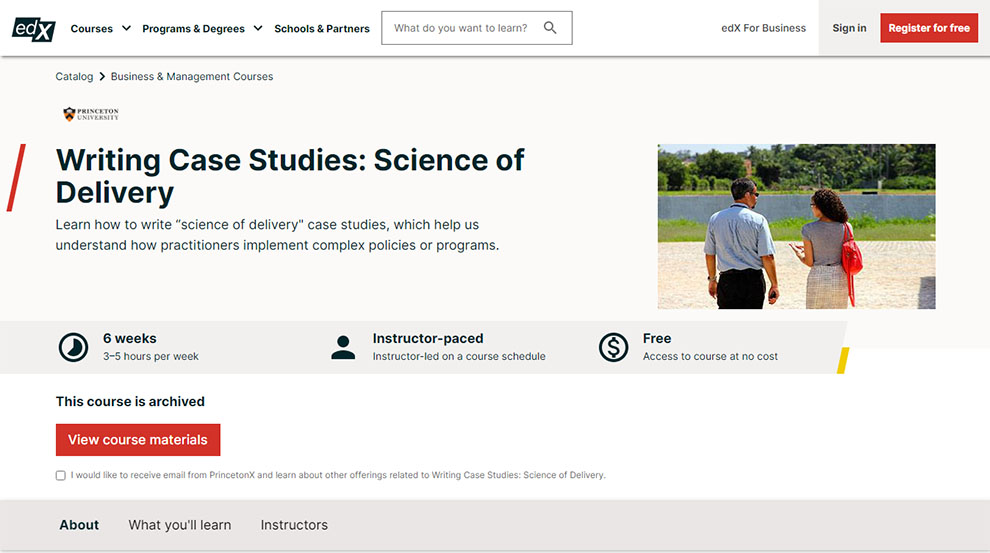
These free online classes Princeton offers, give you a chance to learn how to develop “science of delivering” case studies. The case studies should be put forward in such a manner that it helps the professionals know about how actually things that are said in theory work in action.
Case studies are an essential instrument for communicating insights on the “how” of putting policies into action and reforming institutions.
They detail the processes that were carried out to create results and demonstrate the solutions that people have devised to handle anticipated issues and overcome hurdles that were not foreseen. Case studies provide us with a means of considering how to modify strategies so that they are applicable in a variety of settings.
| Course speed | Instructor-paced |
| Level | Advanced |
| Paid | No |
| Certification | No |
| Duration | 6 weeks (3-5 hours per week) |
| Instructor | Jennifer Widner & Pallavi Nuka |
| Cons | This course is archived for now. |
Topics Covered
- Fundamentals of a Case Study in the Science of Delivery
- Guidelines for Planning a Study
- What to do before, during, and after an interview
- Common research obstacles and how to overcome them
- Steps to take before beginning to write
- Conventions and guidelines for the style that aid in effective expression.
- Methods for overcoming typical obstacles in writing
- Protocols to ensure adherence to relevant ethical and legal norms
Prerequisites
- A working device
- Wi-Fi or internet
- Stationery items
Who should take this course?
- Professionals who seek to record and examine a program or organization
- Researchers looking to track program results
- Graduate students interested in a case study technique
16. Analysis of Algorithms – [Coursera]
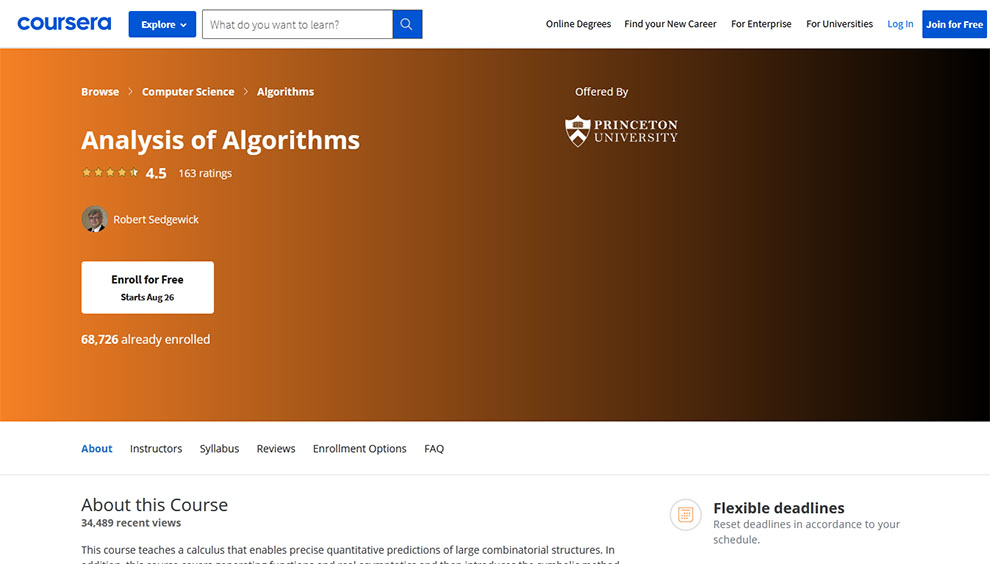
It is the goal of these free online classes Princeton provides, to introduce students to calculus that will allow them to make accurate quantitative predictions about massive complex structures.
This course also discusses producing units and realistic asymptotics before moving on to present the symbolic approach for use in the study of algorithms and other elementary structures like trees, threads, phrases, and translations.
At the end of each lesson, there will be a discussion of several resources that you could find helpful throughout this course.
| Rating | 4.5 |
| Enrollment | 68,446 |
| Paid | No |
| Certification | No |
| Duration | 21 hours |
| Instructor | Robert Sedgewick |
| Cons | The course materials are somewhat dated and could use an update. |
Topics Covered
The topics covered in this course are:
- Analysis of Algorithms
- Overview of recurrence relations
- Overview of generating functions
- counting the number of binary trees
Prerequisites
- A functional computer
- Internet access
- Knowing the basics of computers
Who should take this course?
- Anyone who wants to learn Java
- Anyone who wants to know about algorithms
- Programmers who want to begin a new career
Review ON.
Wonderful insights about the study of the algorithm’s complexity and combinatoric logic.
Final Word
So, these were the 16 free courses by Princeton. Unfortunately, there are no Princeton free online courses with certificates that we could suggest here. If the course is free, it does not come with a certification.
However, edX and sometimes Coursera, too, offer certifications at an additional cost but that is not always the case. In the above listed courses, this option is not available for any.
Nonetheless, the learnings you attain from a Princeton course are going to stay with you forever. Certification or no certification – go ahead and pick the relevant course from your field of interest and get going.





